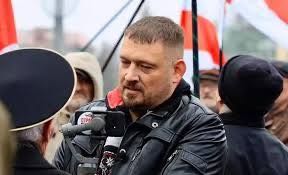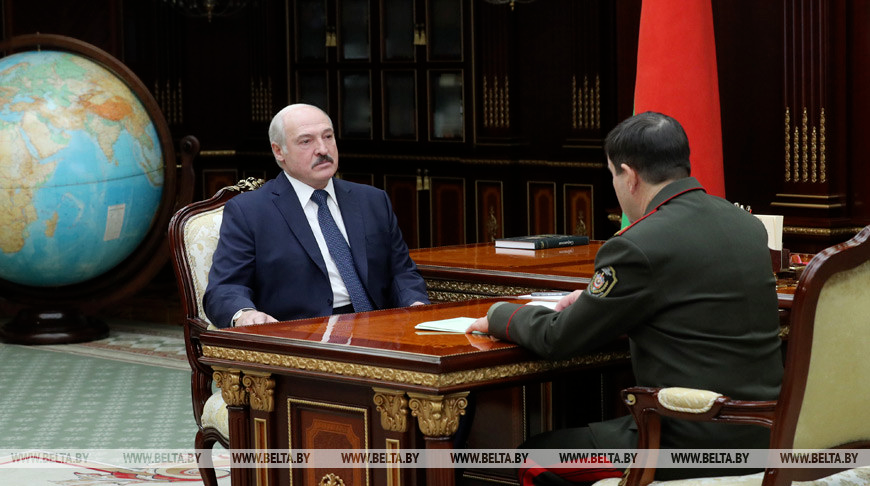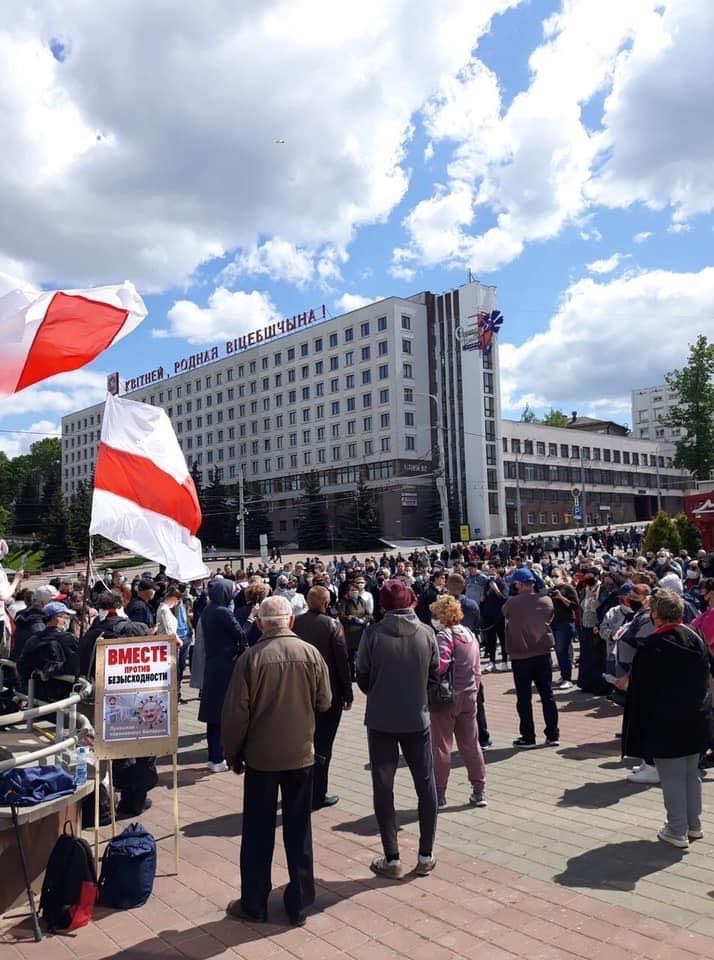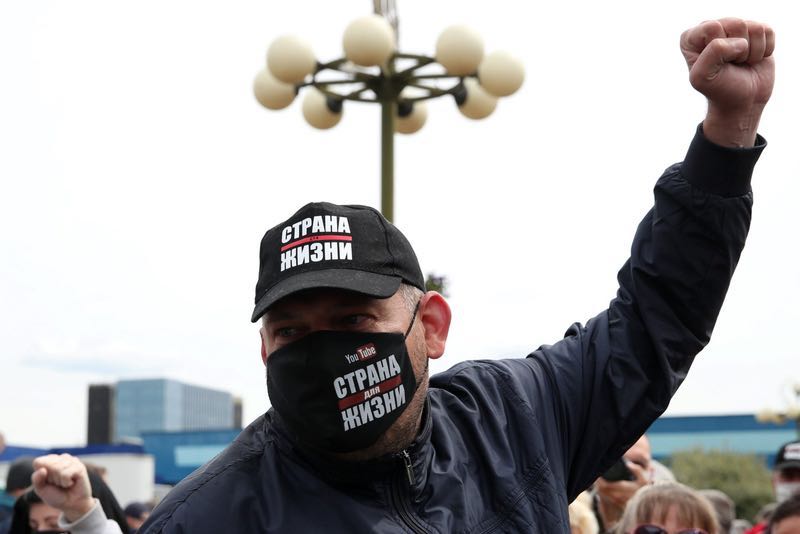With popular vlogger Syarhey Tsikhanouski Belarus now seems to grow its own Alexey Navalny, the Russian oppositionist whose name is never mentioned by Putin. As president Lukashenka seeks reelection in August, his position is weakening, reports Tony Wesolowsky for Radio Liberty/Free Europe. His dismissal of corona as a 'psychosis' further undermined his power. On 31 May police crushed demonstrations in Minsk and put oppositionists in jail for another 15 days.
 Vlogger Syarhey Tsikhanouski (picture twitter)
Vlogger Syarhey Tsikhanouski (picture twitter)
by Tony Wesolowsky
They came in the hundreds, armed with slippers to squash the 'cockroach' at the opposition rally in the Belarusian capital of Minsk on May 24.
The footwear appeal was made by Syarhey Tsikhanouski, a barrel-chested, plain-speaking critic of President Alyaksandr Lukashenka whose YouTube channel outing corruption and graft in the Eastern European country has attracted more than 200,000 subscribers.
Tsikhanouski came up with the mocking moniker for Lukashenka, who has ruled Belarus unchallenged for more than a quarter century, having largely marginalized any opposition or independent media.
However, the coronavirus pandemic has hit Belarus hard, infecting at least 38,000 people and killing more than 200, according to data as of May 27 compiled by Johns Hopkins University. Lukashenka has dismissed the crisis as a 'psychosis', making global headlines for his remedies, like riding a tractor, drinking vodka, and sitting in a sauna. Lukashenka has ignored calls from the World Health Organization and others to institute social-distancing measures.
Crisis of credibility
Amid reports of ill-equipped hospitals and overworked medical staff and a growing list of dying doctors, Lukashenka -nicknamed Batka or 'father' in Belarusian - is facing a crisis of credibility. The timing couldn't be worse for the 65-year-old, who is seeking a sixth term in a presidential election in August amid signs of warming relations with the West, including the United States, as relations remain rocky with Russia, which is pushing for tighter integration.
'Despite the lack of hard data, I assume that the majority of society is disappointed with Lukashenka, who currently offers almost nothing - no social security, no stability of cost of living (prices are still rising), and not even efficient health care,' explained Kamil Klysinski, a senior fellow at the Warsaw-based OSW Center for Eastern Studies.
Klysinski said the high turnout in Minsk on May 24 for an event officially promoted to collect signatures for would-be presidential candidates to get on the ballot should worry Lukashenka and his government.
'A very early signal of growing skepticism towards the regime is high interest toward alternative candidates, which was visible on the 24th of May in Minsk at the beginning of a campaign of collecting signatures for lists of support. It doesn't mean, of course, that people are now ready to demonstrate on the streets, but mistrust and disappointment is high as it's never been before,' added Klysinski in e-mailed remarks to RFE/RL.
Thousands demonstrated again on May 31
On May 31 thousands of Belarusians took to the streets, protesting Lukashenka's increasingly impopular regime. In Minsk 2.000 took part and 30 demonstrators were arrested. Lukashenka warned against a 'maidan in Minsk': 'The goals are clear: to organise a maidan in the run-up to the presidential election or on voting day. That was their plan. Using this meeting I would like to warn you and all people who will hear us, I want to warn all those ‘maidan fanatics' that there will be no maidans in Belarus,' said Lukashenka during a meeting with the KGB security service chief Valery Vakulchik on June 1.
Lukashenka added that 'some people' want 'to sell cheaply everything created not only by President Lukashenka, the authorities but also by people. This is inadmissible. I want to re-iterate, I want to tell those ‘maidan fanatics' once again that we will do our best to keep the situation in our country stable.' Lukashenka earlier stressed that postponement of the presidential elections in August because of corona is excluded.
With the election looming and distrust growing, Lukashenka has opted to crack down even harder on protesters, opposition bloggers, journalists, and other government critics, Human Rights Watch reported earlier this month.
Given Belarus's odd electoral rules, no candidates are even officially registered yet for the August 9 poll, not even Lukashenka. Fifteen candidates have only been cleared by the Central Election Commission to collect the needed 100,000 signatures to get on the ballot. Those making the grade will be announced in July, just a month ahead of the vote.
 President Lukashenka on June 1 warned Belarusian demonstrators against 'maidan in Minsk' (screenshot Belarusian state tv)
President Lukashenka on June 1 warned Belarusian demonstrators against 'maidan in Minsk' (screenshot Belarusian state tv)
Valer Tsapkala, a prominent businessman and former Belarusian ambassador to the United States, and Viktar Babaryka, a banker and philanthropist, are seen by experts as having the appeal and means to make Lukashenka squirm.
Among the notable candidates already ruled out are opposition politician and former presidential contender Mikalay Statkevich, who helped organize the May 24 rally.
The Central Election Commission ruled out Statkevich's candidacy on May 19, pointing to his 'criminal record' for taking part in postelection protests in 2010 when he lost to Lukashenka in another poll deemed undemocratic.
Buzz by vlogger
However, it is Tsikhanouski, 41 - who has traveled across the country, visiting towns and villages, preaching his wish for an 'independent' Belarus free of Lukashenka - who has arguably created the most buzz.
On his YouTube channel, A Country For Living, Tsikhanouski said his supporters had urged him to run, arguing there was no one else to support.
'I want Belarus to have fair and just trials so that everyone, if they are right, could prove it in court. Now this is not the case. All judges are appointed by the president and they follow his will. I think we should get back the constitution that was stolen from us,' Tsikhanouski said.
He was first detained on May 6 and later jailed for 15 days for taking part in protests in Minsk last December over plans to integrate Belarus more closely to Russia under a 1999 union treaty. On May 18, Tsikhanouski was handed another 15 days for meetings with followers in Orsh and Brest, which the authorities deemed unsanctioned public gatherings. On May 19, another court handed him a third 15-day sentence for meeting with supporters in Soligorsk and Miory. He said seven more administrative cases against him for meeting supporters in different towns were still pending.
The Central Election Commission on May 15 rejected his registration documents for his presidential campaign.
However, in a plot twist, not only was Tsikhanouski released from jail but he told reporters on May 20 in his hometown of Homel that his wife, Svitlana Tsikhanouskaya, had been cleared by election officials to run a presidential campaign.
On May 26, Tsikhanouski was in the Belarusian city of Slutsk to gather signatures for his wife's presidential drive, appearing eager to campaign given the public's reaction.
 Belarusians in Minsk on May 31 demonstrate for fair elections (picture twitter)
Belarusians in Minsk on May 31 demonstrate for fair elections (picture twitter)
Svitlana Tsikhanouskaya is shown leaving the Central Election Commission after she submitted documents necessary to register her own presidential campaign on May 15.
'So far, we have not spent anything on the campaign. People themselves are volunteering. We are offered places to spend the night. In Vitebsk, I was told: "Here are the keys to the house. Stay there". We arrived and there is this big, beautiful house,' recounted Tsikhanouski to RFE/RL's Belarus Service.
He also ripped into opposition politicians for failing to connect with Belarusians across the country. 'Where were you before?' asked Tsikhanouski of the country's opposition, hounded for years by Lukashenka's government, but also largely racked by infighting.
'There is no public support for any of them. These parties allegedly exist, are registered and whatnot. But there is no real life, no activity. People ask me why [opposition leaders] don't go out to the towns. They also write in with the same questions,' added Tsikhanouski.
Tsikhanouski's blog within the last months has become one of the most visible platforms of criticism toward the regime, with its simple, clear messages, understandable to everyone.'
Clear message
Klysinski credits Tsikhanouski's clear, simple message and his efforts to reach out to Belarusians for his success.
'He is traveling through Belarusian provinces, including the eastern regions, and meeting with ordinary people and discussing the most important issues. His blog within the last months has become one of the most visible platforms of criticism toward the regime, with its simple, clear messages, understandable to everyone,' Klysinski explained.
Alesia Rudnik, a Belarusian analyst based in Sweden, said Tsikhanouski's appeal to average Belarusians 'is both unprecedented and exciting for a Belarusian voter', adding he was able to reach a younger generation 'as he mainly operates online'.
'His blog within the last months has become one of the most visible platforms of criticism toward the regime'
His growing popularity comes at a key time for Lukashenka, with ties warming with Washington amid ongoing tense relations with Moscow over the Belarusian strongman's refusal to agree to closer integration with Moscow - an idea that sparked protests in Minsk and elsewhere in Belarus in December ahead of what was expected to be a formal signing of 'road maps' spelling out the steps to integrate the two countries, including a single currency.
Moscow responded by cutting oil supplies to Belarus, prompting Lukashenka to seek energy elsewhere, including from Azerbaijan, Norway, Saudi Arabia, and, earlier this month, the United States.
The U.S. deal is for one shipment. But Secretary of State Mike Pompeo dangled an offer for more, saying it 'strengthens Belarusian sovereignty and independence'.
Corona dismissed as 'psychosis'
Belarusian President Alyaksandr Lukashenka has dismissed the coronavirus pandemic as a 'psychosis', even as his country has more than 36,000 officially registered cases of infection and 200 deaths.
Pompeo visited Minsk in early February, when he first offered to sell American oil 'at a competitive price'. Then in April, the two countries formally reestablished diplomatic relations when Julie Fisher, a top State Department official for Europe, was nominated ambassador to Belarus - a position that had been vacant for more than a decade.
Cracking down too hard against Tsikhanouski and other opposition members could shut the door on this new opening to the West, Klysinski said. 'I think that authorities will treat Tsikhanouski as a main enemy (or danger) of these elections and repression will be focused on him - but probably because of the high importance of dialogue with the West, actions against him are still limited', he explained. 'I don't exclude an escalation in this regard in the future, but it will depend on the scale of activity of Tsikhanouski and his supporters.'

 Syarhey Tsikhanouski with the name of his popular YouTube channel Strana dlya Zhizni (A Country for Living)
Syarhey Tsikhanouski with the name of his popular YouTube channel Strana dlya Zhizni (A Country for Living)